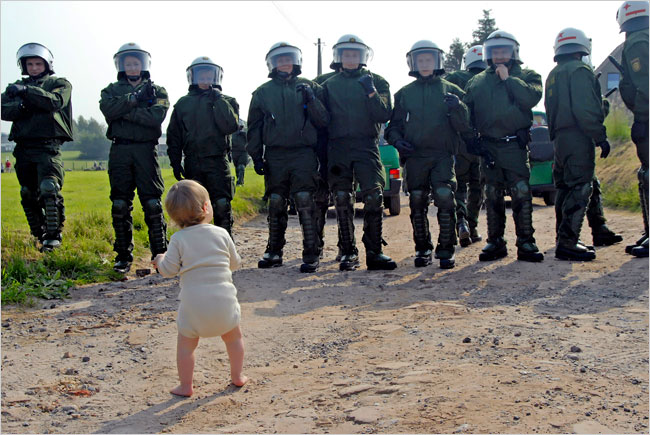How To Speak To Police Officers

 At some point in your life you might be questioned by the police. This can happen for any number of reasons and even if you are questioned by police this is not a sign that you are suspected of a crime or that you will be arrested. Generally speaking, always be courteous to police officers unless you are engaged in a protest or act of civil disobedience, in which case you want to be as courteous as you can while still demonstrating your position. The following information is for general use and gives a basic overview of actions you should and should not take. Always be aware of the laws of your individual state.
At some point in your life you might be questioned by the police. This can happen for any number of reasons and even if you are questioned by police this is not a sign that you are suspected of a crime or that you will be arrested. Generally speaking, always be courteous to police officers unless you are engaged in a protest or act of civil disobedience, in which case you want to be as courteous as you can while still demonstrating your position. The following information is for general use and gives a basic overview of actions you should and should not take. Always be aware of the laws of your individual state.
If you have been detained by the police for any reason it is best that you know your rights and react calmly. Do everything you can to put the officer(s) at ease and give them no excuse to assert authority or use force. The police are trained to thwart violence and many will resort to maximum restraint early in the process if they think you pose a threat. Keep calm and follow the instructions the officer(s) provide you.
The following three rules should be followed at all times when dealing with police.
You are required in many states to to do this or can be charged with obstruction.
You are not required to speak to police or answer any questions aside from the ID question listed above.
Police must have warrants to search you or your property. If they show you a warrant cooperate by staying out of the way and following instructions.
Always call a lawyer if you are detained for questioning or if you are placed under arrest. Do not speak to officers until you have spoken to an attorney.
Police officers work within a system of laws to keep the peace and to prevent and solve crimes. They are assisted best when you cooperate and know your rights. Police can and will use anything you say against you in court, not because they are mean or oppressive but because they are trying to solve mysteries. It can be easy to use any piece of information that you mention as a possible fact in their investigation. Remaining silent is as much to protect you as it is to keep the police from wasting time on false leads and unreliable witness details. If you have something important to say about a crime that you witnessed contact an attorney to help you deliver the information properly and to protect yourself from potential unforeseen consequences.
If you do chose to speak with police remember two things: never lie and be certain of the information you provide. Lying to a police officer is a crime and can be used against you in future criminal proceedings. If you are uncertain of information be very careful and speak to an attorney, incorrect information can cause you to become a suspect, can cause innocent people to be made suspects, and can severely delay investigations while officers follow and sort through false leads.
We live in a society governed by laws. The police act as agents to uphold those laws. Cooperating with police and knowing your rights help them to maximize their time and minimize distractions. Holding the police to the laws important to keeping the system working and free and transparent. Maintain a cooperative attitude and always be calm when around police officers. Help them do their jobs and help yourself stay out of jail by speaking with an attorney and being certain of any facts that you present.
Rodney Staton is a freelance writer, and not an attorney. If you need legal advice, consult a lawyer in your jurisdiction.
